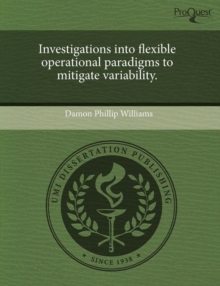The work of this dissertation is concerned with the study of the effectiveness of paradigms of production flexibility to either improve system performance or mitigate system risk.
A brief introduction to the concept of operational flexibility is provided in Chapter I.
In Chapter II, we consider a cross-trained workforce on a serial production line, and we introduce a new strategy of worker cross training called a fixed task zone chain (FTZC) as a special type of zone based cross training.
This new approach seeks to maximize the performance of a production line, in the same fashion as standard two skill chain, but with a significant reduction in the number of skills that must be cross trained.
This allows a firm to maintain nearly the same levels of throughput, but at a fraction of the cross-training and implementation costs.
Our approach shows that less than complete multi-functionality is often times sufficient.
Our model focuses on a twelve station, four worker, and constant work in process (CONWIP) structure to show the value of the proposed paradigm: fixed task zone chaining.
We provide an easily implemented and highly effective policy, the fixed first max shared (FFMS), for worker coordination and demonstrate its superiority versus a number of reasonable policies.
With the FFMS policy, the FTZC achieved on average only 5% throughput loss when compared with a set of benchmark structures.
For most systems, 5% throughput loss is worth it to achieve the reduced skill cross-training the FTZC requires.
Chapter III targets our study of operational flexibility on the field of supply chain management.
A flexible supply chain design is useful to mitigate the effect of stochastic supplier disruptions on operations and, especially, financial cash flows.
The work of this chapter develops mitigation strategies for a firm to use in sourcing from flexible suppliers and demonstrates the conditions under which flexibility in the firm's supply chain is necessary.
Consider a firm sourcing from two flexible but unreliable suppliers for a single product that is sold during a finite selling season.
The firm is exposed to supplier defaults that can adversely affect its revenue during the selling season in two ways: (1) supply defaults that are idiosyncratic to each supplier, (2) a system-wide default that simultaneously disrupts both suppliers.
Our objective function is to maximize total expected profit.
That is, it must prevent finished goods inventory depletion while optimizing inventory holding cost.
In addition to identifying the value of a supplier's diversification strategy, we also find the firm's optimal inventory order quantities in both the single and dual source environments.
Within the single source case we analyzed that model and found that a single sourcing strategy for the firm is best under high marginal profit per unit conditions where disruption risk, both idiosyncratic and system wide, was low.
Conversely, as disruption risk increases, the need to source with a second supplier also increases.
Also, we learned the importance of the firm's cost structure, particularly as it relates to inventory holding cost.
Finally, to assist with the understanding of the flexibility paradigms, we have designed an instrument to promote the understanding of flexibility with respect to cross-training as well as to assist in its implementation.
That is, we develop a hands-on, active learning experience placing participants on the job in a serial production line of cross-trained workers where participants can: (1) learn basic concepts of operations management, production control, and workforce agility; (2) understand system responsiveness and...

